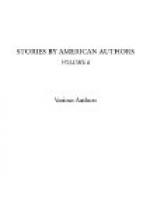“Thuz only two hundred of ’um, boys,” shouted a rough voice. “They’ll run quick enough if you give it to ’um good,” and a second shower of missiles fell into the ranks, the mob arming themselves with the paving-stones at hand.
But the little band of soldiers did not once falter, although here and there in their ranks you could discover a man leaning against a comrade, who gave him support as they moved on together. The crowd seemed a little dashed. The dispersion of the Sixth Regiment had been such a mere bagatelle, and their own number had, since then, been re-enforced by half the professional rowdies in town. They redoubled their cries, which, from jeers, now became shouts of rage and mortification.
“Wot are you ’bout? Give it to ’um good, I tell yer. They daresn’t fire,” howled the same brawny giant who had spoken before.
As they continued the attack, a pistol-shot could be heard now and then from the crowd. The regiment did not return the fire, but as the mob pressed closer, an order from the front was passed along the line.
“Fix bayonets.”
The opposing parties were now only a few feet apart, and a rain of stones was falling so thick and fast as to darken the air, when all at once I saw the colonel’s sword flash out, the blunt edge striking one of the rioters who was pressing on him.
“Clear the way, there!” he cried.
Then, wheeling and facing his command, his voice rang out, clear as a bugle;
“A—r—m—s, ’port! Double-time, march! Ch—ar—ge, bayonets! Hurrah! Give ’em a yell, boys, and you can do it,” added the colonel.
I cannot describe the shout which followed—a clear, ringing, organized whoop; fresh and vibrant; of a perfectly distinct quality from the hoarse, undisciplined howl of the mob—sounding cool and terrible, like the cry of an avenging angel.
The mob turned and fled, appalled, melting away like wax before the blue flame of the glittering bayonets, and the regiment entered the depot.
Then I took time to breathe, and remembered Thomas.
“He ain’t fur f’om yere,” said the boy. “Right ‘roun’ d’ corner.”
And we passed out of the shelter of the doorway to a small, dirty alley, about twenty-five yards distant, where I found the old man resting against a lamp-post, the blood streaming down his face from a ghastly wound in the head, and his eyes closed. I made the boy get some water, and after bathing his face for a few moments, I succeeded in rousing him.
“Is that you, Mist’ Dunkin?” he asked, faintly.
“Yes. How do you feel, Thomas?”
“Dey’s tuhibul times down-street,” he gasped. “I like to got kilt.”
A pause.
“Dey ’lowed dey wanted dem daih papehs—an’—dey didn’t git ‘um—an’—den—den dey hit me side de hade—with a brickbat—an’ I come ‘long tell I git yeah—an’ den, disha boy he come ’long—”




